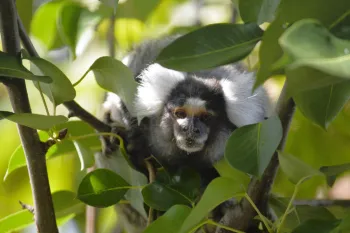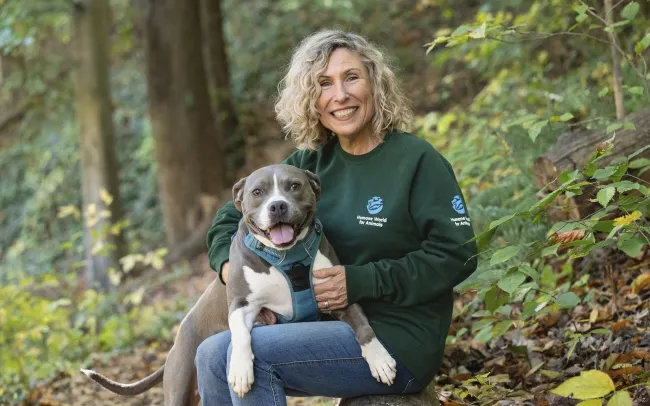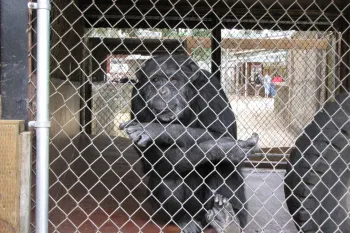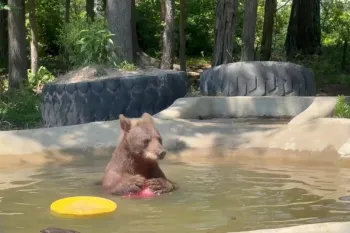The animals who come to live at our sanctuary, Black Beauty Ranch, have often experienced the worst times of their lives. Being able to introduce them to large naturalistic habitats and a space where they can be themselves is an incredible joy, and a reminder of all those who we’re still fighting for.
Earlier this summer, George, a 3-year-old marmoset, arrived at Black Beauty, leaving behind a lonely and bleak situation, trapped in a cage in someone’s basement. At Black Beauty, he’s been paired with Cali, a 7-year-old female marmoset, who had been living at the sanctuary since being relinquished by her owner. The two are getting along wonderfully, climbing trees, leaping from one branch to another, and just hanging out—sometimes upside down! The two groom one another, and they’re building a strong bond, which brings the greatest feeling to our caregivers at the sanctuary.
George and Cali are not the only primate refugees from the pet trade at Black Beauty. The sanctuary is also home to macaques Magilla, Ember and Miya, and capuchins Phoenix and Jackie.
Their flourishing at Black Beauty delights us, but it is also a heartbreaking indication of all we have left to do. The nature of our work is such that we cannot rescue every animal in distress or peril due to human cruelty, neglect or misconduct. There are too many cruelties, too many perpetrators, and too many animals. That’s why we focus so intensely on the prevention of cruelty— and getting at its root causes.
That’s certainly true for the private ownership of captive wildlife, including primates, and their use in entertainment, or at facilities that peddle hands-on encounters with such animals to the public. None of this is good for the animals forced into those situations, who frequently live lives of misery and are at risk of mistreatment, injury and even death.
Nor is private ownership or exploitation of wild animals for entertainment or public encounters good for human beings. These practices endanger public safety and carry serious risk of harm to us, including life-altering and fatal injuries. Moreover, they can create terrible burdens on law enforcement agencies and other parties who must deal with the inevitable incidents and crises that continually arise when accidents, escapes, and injuries occur.
Many of the animals who come to live at Black Beauty have been rescued from difficult situations involving private ownership or misuse in some kind of captive display or public contact operation, with long-lasting consequences for their health and well-being. While it is impossible to restore all that they have lost, there is a lot that we can do for them, and we’re guided by a simple maxim. We give the animals we take in not merely our best, but our all.
Of course, animals like George and Cali are the fortunate ones.
While the number of primates kept as pets in the U.S. is difficult to estimate due to the laxity of state and federal laws and regulations that would provide better data, we have reason to fear that it is rising, driven by social media and public encounter facilities that present these creatures as cute and cuddly, forcing them into unnatural environments and behaviors in order to charge people for a quick photo op. It’s an old but sad story: the viewers of social media posts, and the visitors to such establishments, draw the wrong conclusions, which spurs more breeding, selling and keeping of wild animals as pets.
There is nothing good to be said about private ownership of primates. It’s more than simply inappropriate on animal welfare grounds. It’s a reckless and dangerous practice that puts people and communities at terrible risk. Regrettably, the U.S, is a major contributor to the global demand for pet primates, which fuels the illicit wildlife trafficking industry worldwide.
It’s a vile trade, and we’re working to stop it. That’s why we support passage of the Captive Primate Safety Act (H.R. 3199/S.1594), to prohibit private ownership of nonhuman primates as pets throughout the U.S. To advance that goal, the bill would also prohibit interstate or foreign commerce of nonhuman primates in the pet trade. We’ve documented more than 340 dangerous incidents involving pet primates, in 42 states, over the last 25 years. There have been at least 215 injuries, 76 involving children, and resulted in the deaths of nearly 40 primates.
Some 28 of the incidents described involved marmosets like George and Cali. But we’ll never know most of their names.
Over a long career, I have seen a number of cruelties wither away and disappear, and that gives me not just comfort but confidence in the notion that we can end the kinds of misuse and mistreatment that so many of the animals at Black Beauty endure before they come into our care. We won’t rest until all the animals who suffer in this way are free, and safe—everywhere. We’re so grateful that our supporters understand the importance of this work and have made it possible through their consistent generosity.
Accredited sanctuaries like Black Beauty Ranch are part of a global safety net for animals, an essential one, and so long as there is cruelty in the world, they will always be needed. Sanctuaries are places of potential, too, in which we can watch animals thrive, play, and live their own happy lives. There are deep lessons for us in those places, lessons about our responsibilities, and as the story of George and Cali demonstrates, there are poignant reminders, too—reminders of what our shared devotion to helping animals is all about. We care for those suffering today, and we do all that we can so none will suffer tomorrow.




